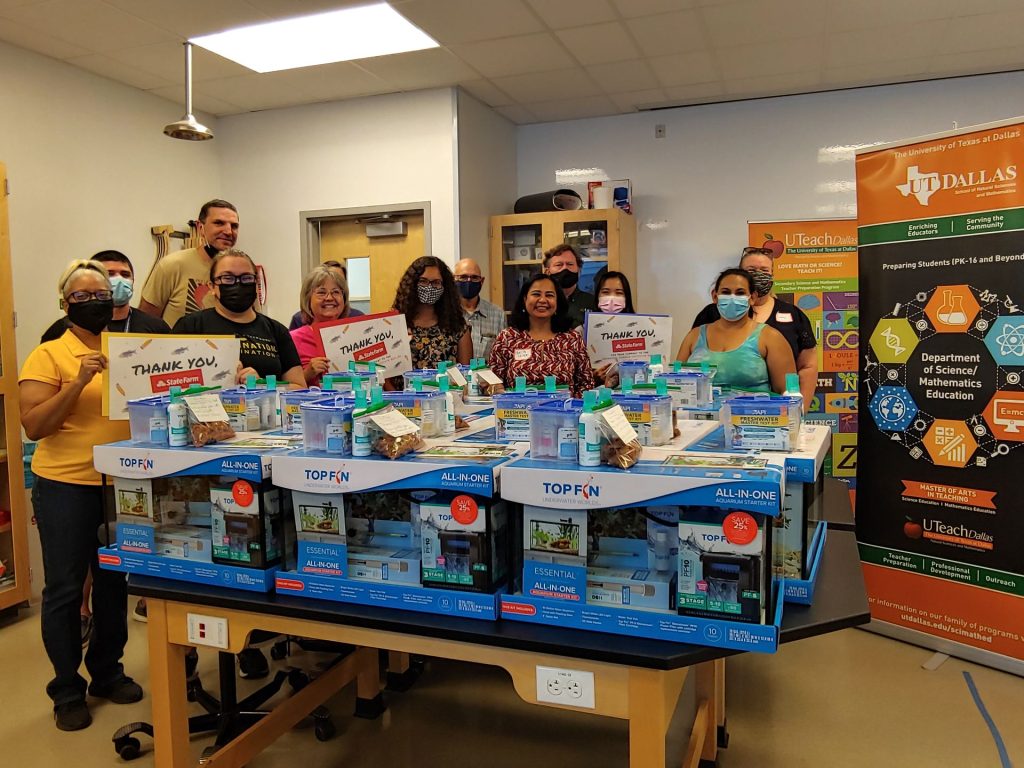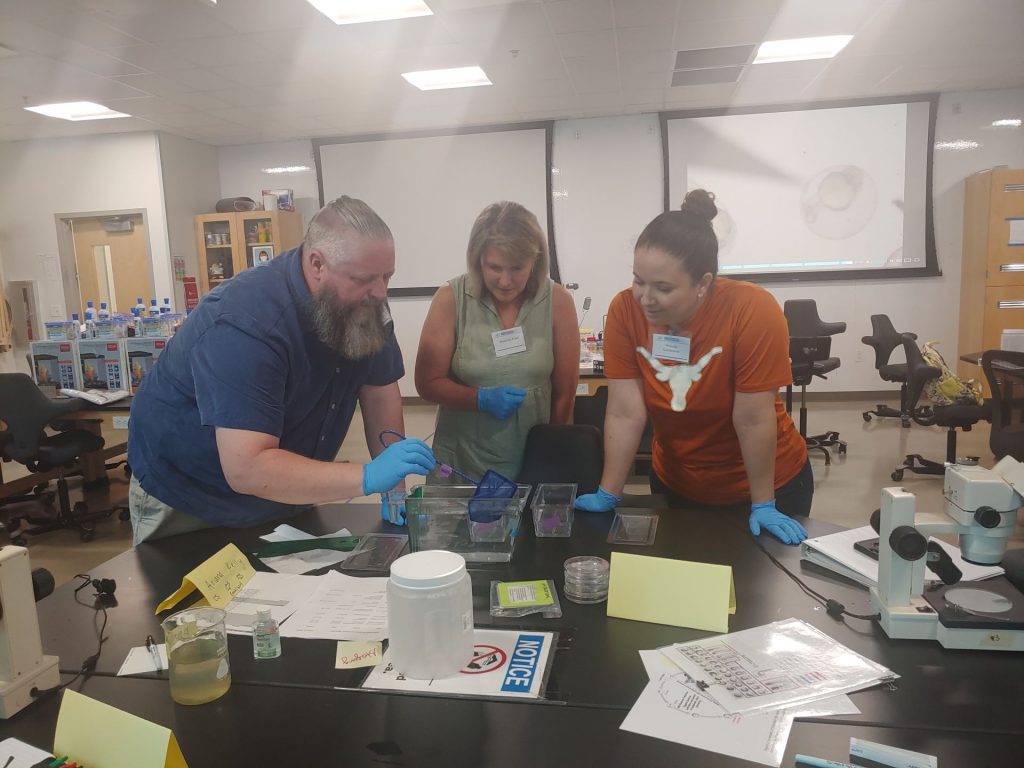
Founded in 2018, the Zebrafish Summer Institute (ZSI) is a unique professional development opportunity for secondary science educators who teach grades 6-12. During a four-day workshop, teachers learn how to use zebrafish to engage their students in authentic, real-world scientific investigations. Workshop participants immerse in hands-on inquiries to explore how to use zebrafish in their classrooms to teach students about concepts like the stages of growth and development, interactions between organisms and the environment, ecology, aquatic biology, and genetics. Dr. Hajeri has developed the TEKS-aligned curriculum for the ZSI.
Highlights of the Zebrafish Summer Institute
- Classroom and lab supplies: All educators are supported with classroom aquarium kits and fish stocks, and a binder of curricular resources to integrate zebrafish into their classrooms.
- Sustained support: Monthly virtual meetings and one-on-one mentoring to troubleshoot challenges, support with lab supplies and resources.
- Networking: Access to a community of educators through GroupMe chat who are teaching with zebrafish.
To learn more about the ZSI, please watch the video
Every summer, Dr. Hajeri recruits 15 secondary science teachers to participate in the fish institute. Applications are open in January every year and close on April 30. If you are an educator and would like to be on our email contact list, please email Dr. Hajeri at vinita.hajeri@utdallas.edu
Teachers interested in participating in the Zebrafish Summer Institute 2026-27 fill the Google form https://forms.gle/f31MyxNJqPgpk75x9
Who? Teachers of Life Sciences and Career Technical Education (CTE-Health Sciences) teaching grades 6-12, who are interested in integrating zebrafish into their courses addressing NEW-TEKS, science phenomena, and Science and Engineering Practices (SEPs). Priority will be given to science educators with 25% of their students being English Learners.
When? First week of June. Dates TBD
Where? Department of Science and Math Education,University of Texas at Dallas, 800 West Campbell Road, Richardson, Texas
Cost: $100 per participant(cost includes virtual and hands-on workshop sessions, meals for the workshop, and year-long support). Participants will receive an aquarium starter kit, a microscope with a camera, zebrafish stocks, and a curriculum binder with resources aligned to NEW TEKS.
Interested? Fill out the Google form to get on our mailing list https://forms.gle/Vjou2kwre4gV6p759
Teachers on the mailing list will be invited to apply in January-February 2026. Applications will close on April 15th, 2026
the IMPACT


As of August 2025, sixty nine secondary science teachers have participated in the Zebrafish Summer Institute and 47 teachers have taught with zebrafish impacting 7,050 students.
Teaching science with zebrafish allows classroom teachers to:
- Spark students’ interests and curiosity.
- Provide opportunities to use science concepts to enhance language development.
- Engage learners in real-world science investigations.
- Build students’ scientific knowledge and process skills.
Teacher Testimonials
Jessie Crowley
The Hockaday school, Dallas
US Science Faculty – Biology
Bibiana Mendez
AP Biology and Honors Biology teacher at Nimitz High School, Irving Indepedent School District, Texas
Shannon Field
10th grade Biology.
China Spring High School, Texas
Emma DeVine
7th and 8th grade science
Greenhill School, Addison, Texas
Congratulations Emma! on the Discovery Education Award Recipients of 2025 https://www.discoveryeducation.com/blog/de-news/discovery-education-awards-2025/
“As a teacher in Dallas ISD, one of my greatest challenges is teaching science content to bilingual students at a level in which they can understand it meaningfully. The inclusion of Zebrafish has allowed me to teach concepts in a way that improves science learning and proficiency. Students are able to use the Zebrafish, embryos, and the fish tank as a learning tool to understand concepts that they might not have with just the use of illustrations or pictures. Students who do not have me as a science teacher even came up with the idea of having an after school club so they too could have the opportunity o come in to see the fish, learn how to handle and care for them, and also to learn about how humans can impact animal life with the choices we make.”
Lucinda Quintana
8th Grade Science Teacher, Ann Richards STEAM Academy, Dallas, Texas“The commitment of the students throughout the zebrafish projects (which have been going on for over three months) has been impressive. Once they figure out one problem, they discover another and automatically get to work on it. Whenever there is a minute or two of downtime in class, they are in the back checking their cultures and monitoring their tanks. The fact that the program can be implemented into any classroom is extremely valuable to teachers who have little or no background in working with live animals or scientific equipment.”



























You must be logged in to post a comment.